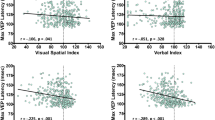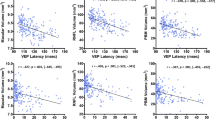Abstract
This study investigated the relationship between clinical symptoms and cognitive dysfunction in multiple sclerosis. Cognitive dysfunction and visual evoked potentials (VEPs) were studied in patients free of physical disability and mildly to moderately disabled patients with multiple sclerosis (MS). Disability–free patients (EDSS ≤ 1.5; n = 13),mildly to moderately disabled patients (EDSS ranging from 2 to 6; n = 13) and a healthy matched control group (n = 16) were examined with respect to attention, verbal and nonverbal memory and early visual processing (VEPs). Disability–free patients showed mild impairments on phasic alertness and divided attention. Deficits were more pronounced in mildly to moderately disabled patients who were additionally impaired with respect to non–verbal memory. Despite adequate visual acuity, one half of all patients showed abnormal VEP latencies for both eyes at the same time. The findings suggest that cognitive deficits are already present in multiple sclerosis even in the absence of physical disability. Even with normal visual acuity, perceptual impairments should be considered as part of the CNS affection.
Similar content being viewed by others
References
Achiron A, Barak Y (2003) Cognitive impairment in probable multiple sclerosis. J Neurol Neurosurg Psychiatry 74:443–446
Amato MP, Ponziani G, Pracucci G, Bracco L, Siracusa G, Amaducci L (1995) Cognitive impairment in early-onset multiple sclerosis. Pattern, predictors, and impact on everyday life in a 4-year follow-up. Arch Neurol 52:168–172
Amato MP, Ponziani G, Siracusa G, Sorbi S (2001) Cognitive dysfunction in early-onset multiple sclerosis: a reappraisal after 10 years. Arch Neurol 58:1602–1606
Arnett PA, Rao SM, Grafman J, Bernardin L, Luchetta T, Binder JR, Lobeck L (1997) Executive functions in multiple sclerosis: an analysis of temporal ordering, semantic encoding, and planning abilities. Neuropsychology 11:535–544
Barak Y, Achiron A (2002) Effect of interferon-beta-1b on cognitive functions in multiple sclerosis. Eur Neurol 47:11–14
Bobholz JA, Rao SM (2003) Cognitive dysfunction in multiple sclerosis: a review of recent developments. Curr Opin Neurol 16:283–288
Callanan MM, Logsdail SJ, Ron MA, Warrington EK (1989) Cognitive impairment in patients with clinically isolated lesions of the type seen in multiple sclerosis. A psychometric and MRI study. Brain 112(Pt 2):361–374
Chard DT, Griffin CM, McLean MA, Kapeller P, Kapoor R, Thompson AJ, Miller DH (2002) Brain metabolite changes in cortical grey and normal-appearing white matter in clinically early relapsing-remitting multiple sclerosis. Brain 125:2342–2352
Comi G, Filippi M, Martinelli V, Campi A, Rodegher M, Alberoni M, Sirabian G, Canal N (1995) Brain MRI correlates of cognitive impairment in primary and secondary progressive multiple sclerosis. J Neurol Sci 132:222–227
Comi G, Martinelli V, Locatelli T, Leocani L, Medaglini S (1998) Neurophysiological and cognitive markers of disease evolution in multiple sclerosis. Mult Scler 4:260–265
Dahl G (1972) Reduzierter Wechsler Intelligenztest (Short Version of the Wechsler Intelligence Test). Hain, Meisenheim
De Stefano N, Narayanan S, Francis SJ, Smith S, Mortilla M, Tartaglia MC, Bartolozzi ML, Guidi L, Federico A, Arnold DL (2002) Diffuse axonal and tissue injury in patients with multiple sclerosis with low cerebral lesion load and no disability. Arch Neurol 59:1565–1571
DeLuca J, Gaudino EA, Diamond BJ, Christodoulou C, Engel RA (1998) Acquisition and storage deficits in multiple sclerosis. J Clin Exp Neuropsychol 20:376–390
Demaree HA, Gaudino EA, DeLuca J, Ricker JH (2000) Learning impairment is associated with recall ability in multiple sclerosis. J Clin Exp Neuropsychol 22:865–873
Diem R, Tschirne A, Bahr M (2003) Decreased amplitudes in multiple sclerosis patients with normal visual acuity: a VEP study. J Clin Neurosci 10:67–70
Diener HC, Scheibler H (1980) Follow-up studies of visual potentials in multiple sclerosis evoked by checkerboard and foveal stimulation. Electroencephalogr Clin Neurophysiol 49:490–496
Exton MS, Baase J, Pithan V, Goebel MU, Limmroth V, Schedlowski M (2002) Neuropsychological performance and mood states following acute interferon-beta-1b administration in healthy males. Neuropsychobiology 45:199–204
Faustmann PM, Ganz RE (1995) Depressivität im schubfreien Frühstadium der multiplen Sklerose. Aktuelle Neurologie 22:173–175
Faustmann PM, Haase CG, Romberg S, Hinkerohe D, Szlachta D, Smikalla D, Krause D, Dermietzel R (2003) Microglia activation influences dye coupling and Cx43 expression of the astrocytic network.Glia 42:101–108
Feinstein A, Youl B, Ron M (1992) Acute optic neuritis. A cognitive and magnetic resonance imaging study. Brain 115(Pt 5):1403–1415
Filippi M, Bozzali M, Rovaris M, Gonen O, Kesavadas C, Ghezzi A, Martinelli V, Grossman RI, Scotti G, Comi G, Falini A (2003) Evidence for widespread axonal damage at the earliest clinical stage of multiple sclerosis. Brain 126:433–437
Fischer JS, Priore RL, Jacobs LD, Cookfair DL, Rudick RA, Herndon RM, Richert JR, Salazar AM, Goodkin DE, Granger CV, Simon JH, Grafman JH, Lezak MD, O’Reilly Hovey KM, Perkins KK, Barilla-Clark D, Schacter M, Shucard DW, Davidson AL, Wende KE, Bourdette DN, Kooijmans-Coutinho MF (2000) Neuropsychological effects of interferon beta-1a in relapsing multiple sclerosis. Multiple Sclerosis Collaborative Research Group. Ann Neurol 48:885–892
Fuhr P, Borggrefe-Chappuis A, Schindler C, Kappos L (2001) Visual and motor evoked potentials in the course of multiple sclerosis. Brain 124:2162–2168
Ganz RE, Faustmann PM (1996) Functional coupling between the central-autonomic and the cognitive systems is enhanced in states after optic neuritis and early multiple sclerosis. Int J Neurosci 86:87–93
Gaudino EA, Chiaravalloti ND, DeLuca J, Diamond BJ (2001) A comparison of memory performance in relapsing-remitting, primary progressive and secondary progressive, multiple sclerosis. Neuropsychiatry Neuropsychol Behav Neurol 14:32–44
Griffin CM, Chard DT, Parker GJ, Barker GJ, Thompson AJ, Miller DH (2002) The relationship between lesion and normal appearing brain tissue abnormalities in early relapsing remitting multiple sclerosis. J Neurol 249:193–199
Haase CG, Faustmann PM (2004) Benign multiple sclerosis is characterized by a stable neuroimmunologic network. Neuro Immuno Modulation 11:273–277
Haase CG, Tinnefeld M, Daum I, Ganz RE, Haupts M, Faustmann PM (2004) Cognitive, but Not Mood Dysfunction Develops in Multiple Sclerosis during 7 Years of Follow-Up. Eur Neurol 52:92–95
Haase CG, Tinnefeld M, Faustmann PM (2004) The Influence of Immunomodulation on Psycho-Neuro-Immunological Functions in Benign Multiple Sclerosis. Neuro Immuno Modulation 11:365–372
Haase CG, Tinnefeld M, Lienemann M, Ganz RE, Faustmann PM (2003) Depression and cognitive impairment in disability-free early multiple sclerosis. Behav Neurol 14:39–45
Hadjilambreva G, Mix E, Rolfs A, Mueller J, Strauss U (2004) Neuromodulation by a Cytokine: Interferon-β differentially augments neocortical neuronal activity and excitability. J Neurophysiol (in press)
Ilmberger J (2003) Deutsche Version des California Verbal Learning Test. Munich
Inglese M, Li BS, Rusinek H, Babb JS, Grossman RI, Gonen O (2003) Diffusely elevated cerebral choline and creatine in relapsing- remitting multiple sclerosis. Magn Reson Med 50:190–195
Kimura D (1963) Right temporal lobe damage. Arch Neurol 8:264–271
Klonoff H, Clark C, Oger J, Paty D, Li D (1991) Neuropsychological performance in patients with mild multiple sclerosis. J Nerv Ment Dis 179:127–131
Koller H, Thiem K, Siebler M (1996) Tumour necrosis factor-alpha increases intracellular Ca2+ and induces a depolarization in cultured astroglial cells. Brain 119(Pt 6):2021–2027
Kurtzke JF (1983) Rating neurologic impairment in multiple sclerosis: an expanded disability status scale (EDSS). Neurology 33:1444–1452
Palace J (2001) Making the diagnosis of multiple sclerosis. J Neurol Neurosurg Psychiatry 71(Suppl 2):ii3–ii8
Parry A, Clare S, Jenkinson M, Smith S, Palace J, Matthews PM (2002) White matter and lesion T1 relaxation times increase in parallel and correlate with disability in multiple sclerosis. J Neurol 249:1279–1286
Paul RH, Beatty WW, Schneider R, Blanco C, Hames K (1998) Impairments of attention in individuals with multiple sclerosis. Mult Scler 4:433–439
Pelosi L, Geesken JM, Holly M, Hayward M, Blumhardt LD (1997) Working memory impairment in early multiple sclerosis. Evidence from an event-related potential study of patients with clinically isolated myelopathy. Brain 120(Pt 11):2039–2058
Poser CM, Paty DW, Scheinberg L, McDonald WI, Davis FA, Ebers GC, Johnson KP, Sibley WA, Silberberg DH, Tourtellotte WW (1983) New diagnostic criteria for multiple sclerosis: guidelines for research protocols. Ann Neurol 13:227–231
Rao SM (1995) Neuropsychology ofmultiple sclerosis. Curr Opin Neurol 8:216–220
Robertson IH, Ward T, Ridgeway V, Nimmo-Smith I (2003) The Test of Everyday Attention. Bury St. Edmunds
Rovaris M, Iannucci G, Falautano M, Possa F, Martinelli V, Comi G, Filippi M (2002) Cognitive dysfunction in patients with mildly disabling relapsing-remitting multiple sclerosis: an exploratory study with diffusion tensor MR imaging. J Neurol Sci 195:103–109
Ruggieri RM, Palermo R, Vitello G, Gennuso M, Settipani N, Piccoli F (2003) Cognitive impairment in patients suffering from relapsing- remitting multiple sclerosis with EDSS ≤ 3.5. Acta Neurol Scand 108:323–326
Vleugels L, Lafosse C, van Nunen A, Charlier M, Ketelaer P, Vandenbussche E (2001) Visuoperceptual impairment in MS patients: nature and possible neural origins. Mult Scler 7:389–401
Warrington EK (1984) Recognition Memory Test. NFER-Nelson, Windsor, UK
Weinstock-Guttman B, Baier M, Stockton R, Weinstock A, Justinger T, Munschauer F, Brownscheidle C, Williams J, Fisher E, Miller D, Rudick R (2003) Pattern reversal visual evoked potentials as a measure of visual pathway pathology in multiple sclerosis. Mult Scler 9:529–534
Zimmermann P, Fimm B (1993) Testbatterie zur Aufmerksamkeitsprüfung. PSYTEST, Würselen
Zivadinov R, Sepcic J, Nasuelli D, De Masi R, Bragadin LM, Tommasi MA, Zambito-Marsala S, Moretti R, Bratina A, Ukmar M, Pozzi-Mucelli RS, Grop A, Cazzato G, Zorzon M (2001) A longitudinal study of brain atrophy and cognitive disturbances in the early phase of relapsing-remitting multiple sclerosis. J Neurol Neurosurg Psychiatry 70:773–780
Author information
Authors and Affiliations
Corresponding author
Additional information
Drs. Tinnefeld and Treitz contributed equally to this work.
Rights and permissions
About this article
Cite this article
Tinnefeld, M., Treitz, F.H., Haase, C.G. et al. Attention and memory dysfunctions in mild multiple sclerosis. Eur Arch Psychiatry Clin Neurosci 255, 319–326 (2005). https://doi.org/10.1007/s00406-005-0565-y
Received:
Accepted:
Published:
Issue Date:
DOI: https://doi.org/10.1007/s00406-005-0565-y




